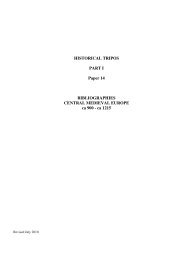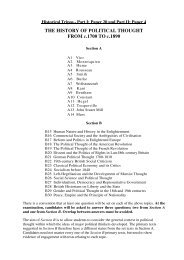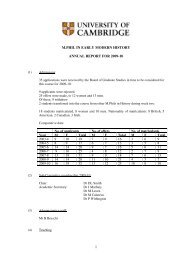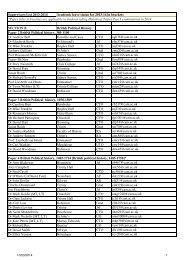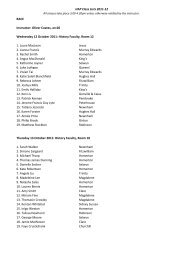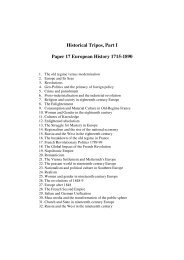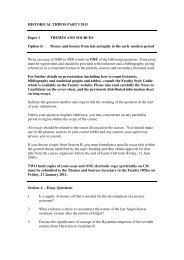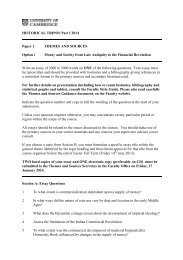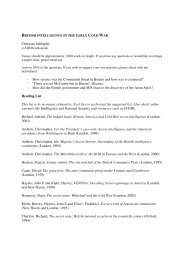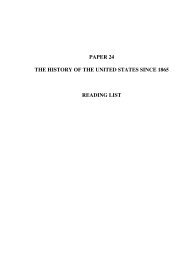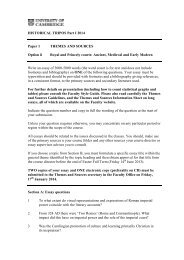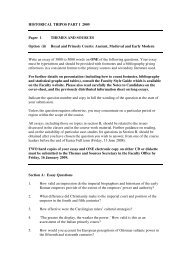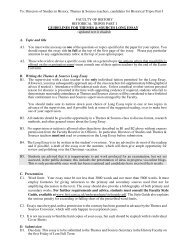Course Handbook - Faculty of History - University of Cambridge
Course Handbook - Faculty of History - University of Cambridge
Course Handbook - Faculty of History - University of Cambridge
Create successful ePaper yourself
Turn your PDF publications into a flip-book with our unique Google optimized e-Paper software.
Tables may be typed on separate sheets or in the text. Tables <strong>of</strong> more than four lines should be numbered<br />
and given suitably descriptive titles, and referred to in the text by number rather than ‘as follows’. Do check<br />
your tables carefully. Are they in the form that the reader will find most helpful Will the reader be able to<br />
compare one set <strong>of</strong> values with another Are all units, percentages and totals identified Do the totals tally<br />
with the individual values You should also make clear (either in the title, the text, or using a footnote) the<br />
source(s) <strong>of</strong> material from which the table has been compiled.<br />
Quotations<br />
Follow the punctuation, capitalization, and spelling <strong>of</strong> the original.<br />
For short quotations use single quotation marks (except for quotations within quotations which should have<br />
double quotation marks). Short quotations (those that do not exceed four lines <strong>of</strong> typescript) should run on<br />
with the main text. Longer quotations should be typed as a displayed extract, i.e. indented and separated<br />
from the rest <strong>of</strong> the text with a line space above and below, using single spacing for the quoted extract.<br />
Longer quotations formatted in this way do not need quotation marks (except for single quotation marks for<br />
quotations within quotations).<br />
Use three point ellipses ... when omitting material within quotations. (Note that there is no purpose in<br />
placing brackets around ellipses; and rarely is there any purpose in placing ellipses at the beginning or end <strong>of</strong><br />
quotations.) Punctuation should come after closing quotation marks, except for exclamation marks and<br />
question marks belonging to the quotation, or a full stop if the quotation is (or ends with) a grammatically<br />
complete sentence beginning with a capital. Some examples:<br />
He declared that ‘the sergemakers are rebelling’.<br />
He made his report. ‘The sergemakers are rebelling.’<br />
He stated that ‘Mr Ovington told me, “the sergemakers will rebel”, but I did not believe him’.<br />
Spelling<br />
Follow British English rather than American English (e.g. defence, labour, programme, sceptical). Note the<br />
following preferences:<br />
-ize<br />
-tion<br />
acknowledgement<br />
appendixes<br />
connection<br />
dispatch<br />
elite (no accent)<br />
focused<br />
indexes<br />
inquiry<br />
judgement<br />
medieval<br />
premise<br />
reflection<br />
regime (no accent)<br />
role (no accent)<br />
Note especially the use <strong>of</strong> -ize rather than -ise. E.g. criticize, emphasize, organize, recognize.<br />
Titles cited in the text<br />
Titles <strong>of</strong> books should be either italicized or underlined; do not use inverted commas. Use inverted commas<br />
and roman type if naming a part <strong>of</strong> a book or an individual chapter. E.g. ‘This point is strongly made in the<br />
fourth chapter, ‘Of sincerity’, in Maxim Pirandello’s Princely government (1582).’<br />
Foreign words and phrases<br />
Foreign words and phrases should be italicized (or underlined), except when they are naturalized, i.e. have<br />
become normalized in English usage. E.g. phronesis, ius naturale, status quo, ex <strong>of</strong>ficio. Some words that<br />
are naturalized may nonetheless still carry accents, if it affects pronunciation, e.g. protégé, whereas ‘regime’<br />
and ‘role’ have lost their accents. Short foreign phrases that are italicized should not also carry inverted<br />
29




